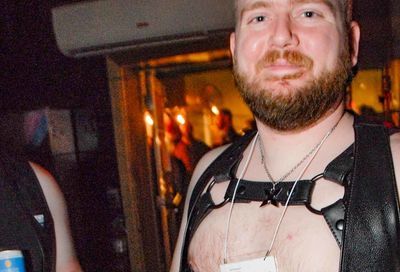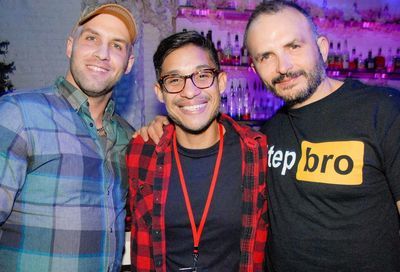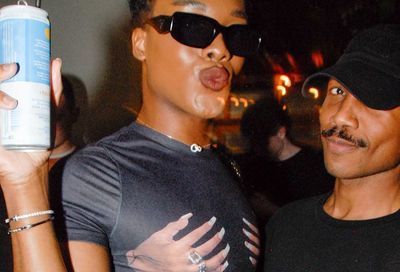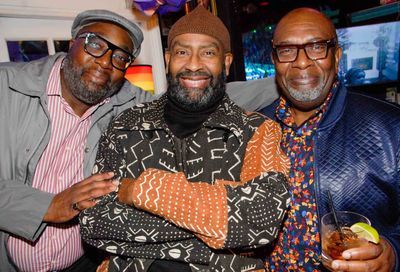Party with a Cause
Attendants and vendors share thoughts on 2007 DC Black Pride festival
It wasn’t until the clock hit the 6 p.m. closing hour of D.C. Black Pride’s ”Liberty, Unity, Strength” Festival that R&B singer Monica finally made it on stage. And just like a true diva, her tardiness was forgiven the moment she sang her first note.
That same stage at the Washington Convention Center saw a lot of action over the course of the annual festival, held on Sunday, May 27, including performances by American Idol second season finalist Frenchie Davis, local drag entertainer Shaquita Lee, and various other performers, emcees and equal-rights advocates, including Del. Eleanor Holmes Norton (D-D.C.).
”We’re not going to have people doing to gay and lesbian people what they did to black people for 200 years,” said Norton from the stage. ”In 2006, by going to the polls to vote, you got you a new Congress. Now I’m asking you to do one more thing for me, go to the polls in 2008, and get us an administration to match the new Congress who will love gay and lesbian people all over the world.”

Her message transcended state lines, and inspired those who had traveled from out of town, including Glenn Linzer, a 40-year-old real estate agent from Louisiana.
”You don’t have to be ashamed of who you are as a person and you get to connect with other people who are also gay, out, living positive, productive lives and being a part of the community,” he said, adding that an ”organized effort” like D.C. Black Pride is something he has yet to come by in his hometown.
For local participants, such as partners Nigel Simon and Alvin Williams, and their three children, of Upper Marlboro, Md., the festival was a family event, featuring more than 100 different vendors, a main stage and a dance tent.
”It’s a time for us to be together as a family, as a community, and as a whole,” said Simon. He and Williams are part of the marriage equality lawsuit currently being pressed in Maryland. ”We can bring our kids and be ourselves and have fun and they know that this is a big part of their dads’ community.”
D.C. Black Pride vice president Ray Daniels cited the attendance of families, like Simon’s, as the highlight of the all-day event.
”I think that coincides with the energy that we devoted to the event,” he said, ”making it encompassing for everyone, and I was happy that people were pleased enough with the talents and the events that we offered.”
”We had a lot of new vendors and sponsors,” he adds. ”I was pleased that many of the people who have come through the years, were able to find something that was new and exciting.”
For Damien T. Frierson, a 28-year-old director of outreach and education at Equality Maryland who has been attending D.C. Black Pride festivals since he was 16 — back when the festival was held outdoors at D.C.’s Banneker Field — the event was a place for open self expression.
”This is a place where I can bring everything that I am,” he said. ”That is being gay, being black, being a male and being proud of who I am, in all of those identities.”
Simone Bell, an outreach associate for Lambda Legal, described the setting as ”a place of liberation” for the black GLBT community, ”who normally cannot come out in our cultural society for fear of losing our family.”
And Tony Milan, 21, a Howard University sophomore studying biology, described Black Pride as ”a weekend that allows black gay youth the opportunity to express themselves in various positive outlets.” It’s different than Capital Pride, he said, because ”it caters more to African Americans, with more hip-hop influenced parties.”
Milan, who also volunteers at Us Helping Us, said he appreciated the health outreach on display by organizations like the National Association of People With AIDS (NAPWA), including condom distribution; and Whitman-Walker Clinic, which featured a rapid-HIV-testing truck.
ReGina Newkirk, Whitman-Walker Clinic’s director of development, said several people had taken the test, which generates results in 20 minutes.
”We want to make sure, that particularly with the high HIV rates in the African-American community, that people are getting tested, that people know their status, and that people are engaging in safe-sex practices,” she said.
”Lots of times the African-American community just doesn’t receive as much information, and so we’re really committed to making sure we’re getting out to the community and getting that information distributed.”
Andrew Spieldenner of the National Association of People with AIDS (NAPWA) emphasized the importance of visibility.
”D.C. Black Pride is an amazing time to celebrate, come together and be counted,” Spieldenner said. ”I think it really shows that people still come, they still support it. It’s a great opportunity for people to come together from the community side, the service side, business side, and I think the growth of the business is really amazing.”
One of those business vendors, Ebony Pyramid, caught people’s attention with racy videos of wild parties — what the company’s director of regional operations, Lisa Brown, describes as a ”Black Pride cruise to the Bahamas.”
”This is actually our cruise from last year,” said of Brown. ”What you’re watching is when we’re in the Bahamas, we generally book a club… and we have Bahamian gay, lesbian, transgender folks that come and party with us when we’re down there. It’s fabulous.”
Like Ebony Pyramid’s Columbus weekend cruise, Brown said the festival provides a place where ”we can celebrate who we are with the folks that we love and we can be free to be us. For the younger folks it gives them the opportunity to see that they’re not alone and it gives them the venues in which they can get information to explore and know who they are, so it’s needed.”
One vendor geared toward black gay youth was Targeting a Dream, which in addition to providing grants to not-for-profit organizations in metropolitan Washington and Baltimore, also awards scholarships to high school and college GLBT students.
Tamara Dunlap-Elkins founded the organization while working in the nightlife industry.
”I would try to gear a lot of our money towards non-profit organizations. From that I ended up being in an incident where I had to educate people about same-sex domestic violence because they weren’t aware of it, and I’m a sociologist at heart, so I wanted to help the community,” she said.
It’s something Dunlap-Elkins was happy to share with attendants at the ”Liberty, Unity, Strength” festival.
”It allows me as a lesbian, to show other lesbian, gay, bisexual, transgender people that there’s more than just clubbing, there’s more than just partying,” she said. ”And that same-sex relationships can mean more, than just the same sexes getting together.”
Support Metro Weekly’s Journalism
These are challenging times for news organizations. And yet it’s crucial we stay active and provide vital resources and information to both our local readers and the world. So won’t you please take a moment and consider supporting Metro Weekly with a membership? For as little as $5 a month, you can help ensure Metro Weekly magazine and MetroWeekly.com remain free, viable resources as we provide the best, most diverse, culturally-resonant LGBTQ coverage in both the D.C. region and around the world. Memberships come with exclusive perks and discounts, your own personal digital delivery of each week’s magazine (and an archive), access to our Member's Lounge when it launches this fall, and exclusive members-only items like Metro Weekly Membership Mugs and Tote Bags! Check out all our membership levels here and please join us today!





















